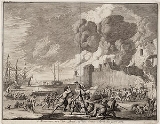
Capture of Brielle
Encyclopedia
The Capture of Brielle by the Sea Beggars, or Watergeuzen, on 1 April 1572 marked a turning point in the uprising of the Low Countries
against Spain
in the Eighty Years' War. Militarily the success was minor, as Brielle
was not being defended at the time. It did, however, provide the first foothold on land for the rebels at a time when the rebellion was all but crushed, and it offered the sign for a new revolt throughout the Netherlands. Over the next years the decision of the northern provinces to join the rebels would form the beginning of the Dutch Republic
.
. After they were expelled from England by Elizabeth I, they needed a place to shelter their 25 ships. As they sailed towards Brill, they were surprised to find out that the Spanish garrison had left in order to deal with trouble in Utrecht
. On the evening of April 1, the 600 men sacked the undefended port. As they were preparing to leave, one of the men said there was no reason they should leave where they were.
In English, this translates into "On April 1st, Alva lost his glasses". The pun
arises from the fact that the name of the town ('Brielle' or 'Den Briel') sounds like 'bril', which is Dutch for 'glasses'.
Seventeen Provinces
The Seventeen Provinces were a personal union of states in the Low Countries in the 15th century and 16th century, roughly covering the current Netherlands, Belgium, Luxembourg, a good part of the North of France , and a small part of Western Germany.The Seventeen Provinces were originally held by...
against Spain
Spain
Spain , officially the Kingdom of Spain languages]] under the European Charter for Regional or Minority Languages. In each of these, Spain's official name is as follows:;;;;;;), is a country and member state of the European Union located in southwestern Europe on the Iberian Peninsula...
in the Eighty Years' War. Militarily the success was minor, as Brielle
Brielle
Brielle , also called Den Briel is a town and municipality in the western Netherlands, in the province of South Holland, on the north side of the island of Voorne-Putten, at the mouth of the New Maas. The municipality covers an area of 31.12 km² of which 3.63 km² is water...
was not being defended at the time. It did, however, provide the first foothold on land for the rebels at a time when the rebellion was all but crushed, and it offered the sign for a new revolt throughout the Netherlands. Over the next years the decision of the northern provinces to join the rebels would form the beginning of the Dutch Republic
Dutch Republic
The Dutch Republic — officially known as the Republic of the Seven United Netherlands , the Republic of the United Netherlands, or the Republic of the Seven United Provinces — was a republic in Europe existing from 1581 to 1795, preceding the Batavian Republic and ultimately...
.
Overview
The Sea Beggars were led by William van der Marck, Lord of Lumey, and by two of his captains, Willem Bloys van Treslong and Lenaert Jansz de GraeffLenaert Jansz de Graeff
Lenaert Jansz de Graeff , was a member of the family De Graeff and the son of Jan Pietersz Graeff, a rich cloth merchant from Amsterdam...
. After they were expelled from England by Elizabeth I, they needed a place to shelter their 25 ships. As they sailed towards Brill, they were surprised to find out that the Spanish garrison had left in order to deal with trouble in Utrecht
Utrecht (city)
Utrecht city and municipality is the capital and most populous city of the Dutch province of Utrecht. It is located in the eastern corner of the Randstad conurbation, and is the fourth largest city of the Netherlands with a population of 312,634 on 1 Jan 2011.Utrecht's ancient city centre features...
. On the evening of April 1, the 600 men sacked the undefended port. As they were preparing to leave, one of the men said there was no reason they should leave where they were.
Legacy
Dutch students are taught a short rhyme to remember this event:- "Op 1 april verloor AlvaFernando Álvarez de Toledo, 3rd Duke of AlbaDon Fernando Álvarez de Toledo y Pimentel, 3rd Duke of Alba was a Spanish general and governor of the Spanish Netherlands , nicknamed "the Iron Duke" in the Low Countries because of his harsh and cruel rule there and his role in the execution of his political opponents and the massacre of several...
zijn bril"
In English, this translates into "On April 1st, Alva lost his glasses". The pun
Pun
The pun, also called paronomasia, is a form of word play which suggests two or more meanings, by exploiting multiple meanings of words, or of similar-sounding words, for an intended humorous or rhetorical effect. These ambiguities can arise from the intentional use and abuse of homophonic,...
arises from the fact that the name of the town ('Brielle' or 'Den Briel') sounds like 'bril', which is Dutch for 'glasses'.

